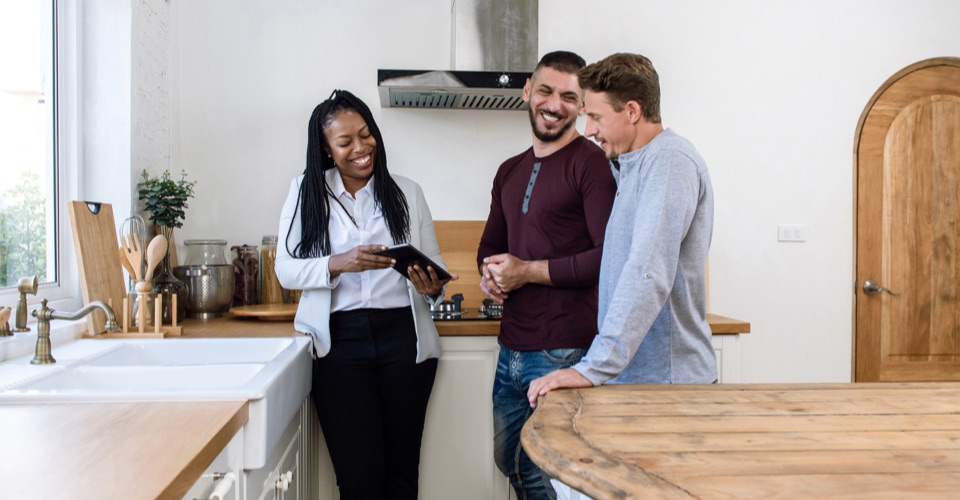
Buying a home
Buying your first home and not sure where to start? We'll guide you every step of the way!

Steps for first-time home buyers
Need a helpful reference? Download the Homebuyer's Guide (PDF, 3.8 MB).
How to buy a house
Review your budget to include your homebuying plans. Think about your down payment, closing costs and available assistance programs for first-time homebuyers. Use our calculators to see how much you can afford and then get pre-approved.
What's your budget and how much can you afford?
Before calculating your borrowing capacity, make a detailed list of your income and expenses. Use our online budgeting tool, Your budget, to make sure you don't forget anything.
Then, estimate how much you can afford to pay for a home. We recommend that you:
- Don't put more than 32%
1 of your gross household income toward housing expenses. - Keep your total debt payments under 40%
1 of your gross household income.
Remember that these are just estimates and your caisse will take more information into consideration when you apply.
Do you use AccèsD? Log in to AccèsD and go to Home to calculate your borrowing capacity.
Advice
To make sure you can cover all your payments, deal with unexpected financial emergencies and maintain your current standard of living, look for a home that's under your maximum borrowing capacity.
Down payment
This is the sum of money that you pay when you buy a property. You could build your down payment with your personal savings, your RRSP, an inheritance or cash gifts
How much you need for a down payment
- For a property of $500,000 or less, your down payment should be at least 5% of the purchase price.
- For a property from $500,000 to $999,999, your down payment should be at least 5% of the first $500,000 and 10% of the rest.
- For a property of $1 million or more, your down payment should be at least 20% of the purchase price.
In some cases, a larger down payment may be required.
If your down payment is less than 20%, your loan has to be insured by the Canada Mortgage and Housing Corporation (CMHC) External link or Sagen External link. You pay a premium based on your down payment amount and a 9% tax on this premium. The premium itself can be paid in full or built into your mortgage payments.
As for the tax, your caisse will deduct the amount from your account at the time of disbursement to the notary (during the purchase transaction).
How to save for a down payment
- Start saving early and consistently. Make it simple by setting up automatic transfers with our AccèsD online and mobile services.
- Save your money in a tax-sheltered plan, like a first home savings account (FHSA) or an RRSP.
- Take advantage of government incentives to boost your down payment.
Incentives for first-time home buyers
Home Buyers' Plan (HBP)
This program allows you to withdraw from your RRSPs tax-free to buy or build a home.
What's the Home Buyers' Plan?
- Available to first-time buyers who don't own a primary residence in the year of the withdrawal or haven't in the 4 previous years.
- You can withdraw up to $60,000 per person and up to $120,000 per couple.
- You have to start repaying your money 2 years after your withdrawal, except for withdrawals made between January 1, 2022, and December 31, 2025. In that case, you can start repayments 5 years after your withdrawal.
- You have 15 years to repay the full amount you withdrew under the HBP, interest-free.
First home savings account (FHSA)
This new registered account lets you save for your first home tax-free.
What is the FHSA?
- Available to Canadian residents who are at least 18 years of age
- Available to people who don't own a primary residence in the year they open the account or haven't in the 4 previous years
- Annual contributions up to $8,000, to an account maximum of $40,000
HBP or FHSA: Which is right for you?
You can either combine the FHSA and the HBP for your first down payment or select the one that works best for you.
Provinces and municipalities also offer various tax credits and refunds. Find out which ones you may qualify for.
Closing costs
These fees
Cash back for closing costs
You could get cash back
Mortgage pre-approval
When you get pre-approved, you find out how much you can afford to spend when buying a home. A pre-approval also locks in your rate for a limited time.
Even though getting pre-approved is an important part of the process, there's no obligation on your part.
Choosing the right home
Whether you're shopping for a house, condo or planning to build your own, it's important to choose one that works with your budget and lifestyle. Compare the options.
Existing home
- Established neighbourhood
- Landscaped yard
- Extra features like an in-ground pool, finished basement, etc.
- GST might apply for some major renovations
Advice
If you choose a property that needs work, consider combining the renovation costs into your mortgage so you won't have to get new financing later.
Need renovation help? Through EspaceProprio, we can offer you personalized support from RenoAssistance External link.. They can connect you to the professionals you need to make your vision a reality.
New homes
- Option to improve or select the exterior siding, flooring, plumbing and electrical accessories
- Built according to recent construction standards
- Comes with contractor’s or builder’s warranty
- GST and QST apply
Advice
Before you buy or build a new home, ask for references from the contractor and find out if they offer new home warranties. Also, check whether they are listed in the Garantie de construction résidentielle (GCR) External link business directory (in French only). GCR accreditation is required by the Building Act and provides protection while the organization is an excellent source of information about down payments paid to your accredited construction business.
Condos
- Option to buy a new or existing condo
- Some spaces are shared among owners
- Condo fees required to manage the building
Self-builds
- You need to own or buy land
- For individual properties occupied as principal residences
- Large-scale projects that require time, organization, knowledge and liquid cash
- Financing done through progressive disbursements as the project advances
Advice
Take the time to assess your needs and budget. Make a detailed plan before you start a self-build. Have a look at the DIY Homebuilders' Guide (PDF, 836 KB).
Other types of homes
If you have another type of home in mind, schedule a call with a mortgage advisor. They are the most qualified to fill you in on the financials of various home options.
Good to know
Under the Sustainable Home Program, you may be eligible for cash back if you purchase a sustainable new build or make sustainable renovations.
Making a purchase offer
Once you've found a home you want, the next step is to make a purchase offer. If your offer is accepted, make sure you have the property inspected and get a certificate of location.
What's a purchase offer?
A purchase offer, also known as a promise to purchase, is a contract that legally binds you to buy the property from the seller, under certain conditions.
Some elements of a purchase offer
- Address and lot number
- Deposit amount
- Possession date
- Tax adjustment
- Length of time the offer is valid (usually between 24 and 48 hours)
- What’s included in or excluded from the selling price (e.g., curtains, household appliances)
- Approval of mortgage (condition on the purchase)
- Satisfactory inspection of the premises by an expert (condition on the purchase)
- Sale of your current house (if you’re already a homeowner)
- Any other condition(s) deemed appropriate
7
What happens after the purchase offer is made?
The seller accepts or rejects the offer.
- If the offer is accepted, it's legally binding and neither the buyer nor the seller can back out. A broken agreement could lead to the seller or buyer being sued for damages. The buyer could even lose their deposit.
- If the offer is rejected, the seller can make a counter offer (on the price, closing date and so on). You can either accept it or turn it down. If you reject it, you can make another counter offer.
What's the inspection for?
The inspection is a visual examination of the property to identify defects before the purchase is complete. Once your offer is accepted, you arrange for an inspection by a building inspector who then gives you an inspection report. The report describes things like the condition of the foundation, roof, structure, windows, insulation, plumbing and electrical system.
If your offer is conditional on the inspection and the report reveals some problems, you could negotiate the price or even cancel the purchase offer.
Advice
To find an inspector with recognized credentials, look for a professional who follows best practices and is a member of a home inspection association, corporation or professional order.
What's a certificate of location?
This is a document prepared by a land surveyor. It describes the lot and building, identifies any irregularities and lists any easements or specific bylaws or regulations that may restrict a property owner’s rights.
Most mortgage lenders require a certificate of location.
Who provides it?
The conditions in the purchase offer determine who should provide the certificate, but it's usually the seller's responsibility.
Financing your home
Your offer has been accepted and now, you need to finance your home. Learn more about 2 financing options: a mortgage and a home equity line of credit. Check our rates and use our mortgage calculators to help you decide which is for you.
Mortgages
A mortgage is a loan used to finance the purchase of a home. Mortgages are either open or closed. Their rates may be fixed, variable or annually adjustable.
Versatile Line of Credit
The Versatile Line of Credit is a home equity line of credit (HELOC). You can use it to finance your home or access your home equity to pay for other things.
With the Versatile Line of Credit, you can personalize your mortgage and tie several loans to it. Each loan has its own interest rate, term and payment frequency.
Mortgage rates
The mortgage rate is used to calculate the cost of your loan, that is, the interest you'll pay the financial institution for your mortgage. It may be fixed, variable or annually adjustable.
Advice
Use our calculators to compare your options.
- Mortgage payment calculator
- How long will it take to pay off your mortgage?
- Mortgage prepayment charge calculator
Your mortgage advisor can also help you choose the right kind of financing for your needs.
Insure your mortgage and home
Protect your mortgage for peace of mind in the event of death or disability. Take out the right home insurance for your new property to protect yourself against the most common risks.
Loan Insurance
Loan Insurance provides 2 types of coverage:
- Life insurance pays the balance of your loan in the event of death and protects your loved ones from the financial stress of taking over your debts
- Disability insurance, which will make the payments on your loan in the event of accident or illness
Advice
If you have salary insurance, get informed before deciding whether or not to protect your mortgage. Consider your ability to make your mortgage payments if an accident or illness were to prevent you from working for a while. Remember that you'll have to cover your mortgage, regular expenses and other costs.
In most cases, salary insurance only covers two-thirds of your current income so it would be wise to take out Loan Insurance.
Home insurance
Home insurance
All-risk coverage includes basic protection. It covers you for accidental events such as fire, theft or vandalism. You can add optional coverage for your specific needs, such as insurance for your pool.
Signing the deed of sale
Take care of all the details before becoming a homeowner.
What's a deed of sale?
It's a legal document that details the transfer of a property from the seller to a buyer. It is signed at the notary's office with the seller.
Before you sign
- Make sure the notary received all necessary documents, including the certificate of location.
- Review the adjustment statement that details the amount that has to be paid to the seller to conclude the sale.
- Send your down payment to the notary.
- Provide proof of home insurance for an adequate amount.
The seller has to provide the title and also guarantee that the property is free of any major defects that would make it unsuitable for its intended use.
Your notary takes care of the legal aspects involved in transferring property titles, checks all the documents and provides you with the ones you need.
Once the deed of sale is signed, you're a homeowner!
Cash back for first-time home buyers
Get between $1,500 and $4,000 cash back
- $1,500 for a mortgage of $100,000 to $299,999
- $2,500 for a mortgage of $300,000 to $499,999
- $3,000 for a mortgage of $500,000 to $749,999
- $3,500 for a mortgage of $750,000 to $999,999
- $4,000 for a mortgage of $1,000,000 and more
You could also receive an additional $500 in cash back if you take out Loan Insurance with us.
This offer is valid until June 30, 2025. Contact us to see if you qualify!
Thinking about moving to Canada?
Here are some tips to help you plan for this milestone.
- Topic: Loans and borrowing Why talk to an advisor when buying a home?

- Topic: Loans and borrowing Housing: The advantages of buying or renting property in Canada

Contact us
By phone
Monday to Friday: 8 AM to 9 PM
Saturday: 9 AM to 6 PM
Elsewhere in Canada:
1-844-626-2476 Canada-wide mortgage services. This link opens your phone app.
We can also call you when it's convenient.
To be eligible for the cash back, you must purchase home insurance with Desjardins General Insurance Inc. or The Personal General Insurance Inc. Certain conditions, exclusions and limitations may apply.
The cash back will be disbursed for mortgages used to purchase an eligible building of 4 units or less. The property must be your primary residence. Self-builds and mobile homes on leased land are not eligible. Contact a Desjardins advisor for all the conditions, exclusions and limitations of the offer. You must meet all the requirements to get the offer.
All financing subject to Desjardins credit approval.
This offer is subject to change or termination without notice.